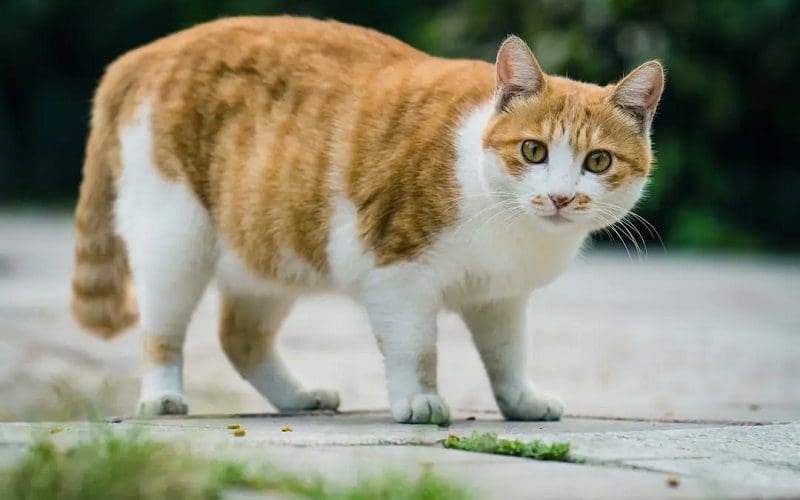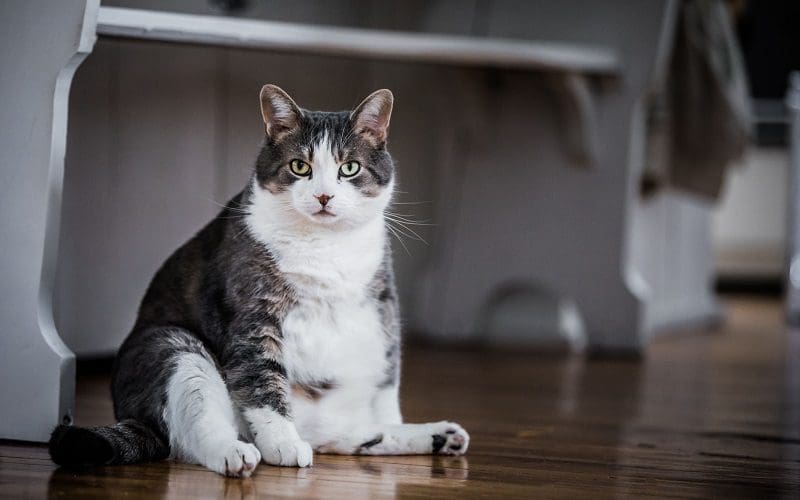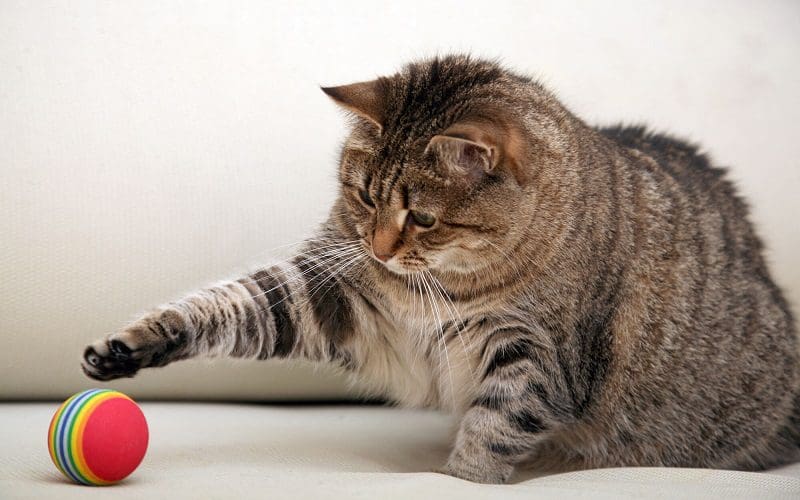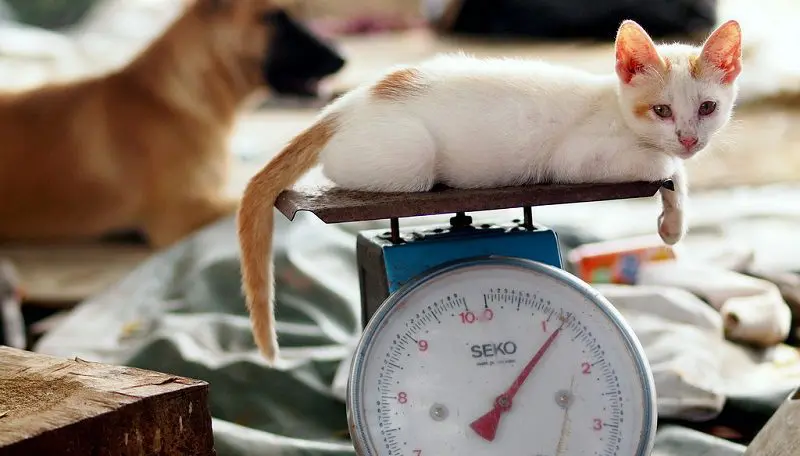Last Updated: 2 years ago
Cats are beloved pets, but it’s important to make sure they stay healthy.
One of the most important factors in a cat’s health is its weight.
But how much should cats weigh?
It can be difficult to know if your furry friend has a healthy cat weight, and being overweight can lead to serious health problems.
So, how heavy should my cat be?
What is a Healthy Cat Weight

How much should cats weigh?
This is a question that many cat parents ask themselves, especially if their cat is starting to put on a few extra pounds.
It’s important to know that there is no ideal weight for all cats. Cats come in all shapes and sizes, and their ideal weight will depend on their individual body type.
However, there are some general guidelines that can help you determine a healthy cat’s weight.
One way to determine if your cat is at a healthy weight is to look at its body condition score. This is a score that takes into account your cat’s body weight, body fat, muscle mass, and overall body condition.
A score of 1-3 is considered underweight, a 4-5 is considered a healthy cat weight, while a score of 6-8 is considered overweight. If your cat has a body condition score of 9, it is considered obese.
Another way to determine if your cat is at a healthy weight is to look at its waist-to-hip ratio. This ratio is determined by dividing your cat’s waist circumference by its hip circumference.
A ratio of 0.5 or less is considered healthy, while a ratio of 0.6 or higher is considered overweight.
If you’re concerned about how much your cat weighs, talk to your veterinarian. They can help you determine if your cat is at a healthy weight and make recommendations for how to help them maintain a healthy weight.
Health Problems Caused by Obesity in Cats

As pet owners, we all want our furry friends to be happy and healthy. Unfortunately, obesity in cats can lead to a variety of health problems that can cause them discomfort and pain.
From diabetes to joint pain, understanding the risks associated with excess weight is important for any pet parent.
Here are some problems that can be caused by cats being overweight or obese.
Diabetes
Obesity in cats can increase their risk of developing type 2 diabetes due to an inability to properly process glucose.
This condition requires lifelong treatment and management from your veterinarian as well as lifestyle changes such as diet modification and increased exercise.
Joint Pain
Cats who are overweight or obese may also experience joint pain due to the extra strain on their joints from carrying around extra weight.
Joints become inflamed which causes stiffness, difficulty moving around, and even lameness in some cases.
Arthritis
Arthritis is another common issue caused by obesity in cats that leads to chronic inflammation of the joints resulting in severe pain when walking or jumping up onto furniture or other surfaces.
Respiratory Difficulties
Respiratory difficulties are more likely to occur in overweight or obese cats.
This is because excess fat deposits accumulate around the chest cavity, causing challenges in breathing normally during exercise or playtime.
Cats at a healthy weight range for their breed and size can naturally engage in physical activities without such hindrances.
Additionally, this puts additional stress on their heart which could lead to further complications down the line if not addressed promptly with proper care from you and your vet team!
It’s important for us as pet parents to keep an eye out for signs of obesity in our feline friends so we can take action before these issues become serious health concerns requiring medical intervention – something no one wants!
If you’re concerned about how much your cat weighs and how much they gain then make sure you speak with your veterinarian about creating a personalized plan tailored specifically towards helping them reach (and maintain) a healthier body weight.
Ways to Help an Obese Cat Lose Weight Safely and Effectively

As a cat owner, it can be heartbreaking to see your beloved pet struggle with obesity.
While cats are naturally inclined to stay active and maintain a healthy weight, sometimes they can become overweight due to overfeeding or lack of exercise.
Fortunately, there are ways you can help an obese cat lose weight safely and effectively.
Diet
First off, the most important thing is to reduce their food intake gradually so that they don’t become malnourished in the process.
Start by cutting back on treats and reducing portion sizes slightly each day until you reach a healthy level for your cat’s size and age.
It’s also important to feed them high-quality foods that contain plenty of protein as well as other essential nutrients like omega fatty acids which will help keep them full longer while still providing all the nutrition they need for good health.
Reducing their food intake, increasing activity levels is another great way to help an obese cat lose weight safely and effectively.
Playing Regularly
Playing with your cat more often or taking them for walks (if possible) are both excellent ways of getting them moving around more frequently throughout the day which helps burn calories faster than just sitting around all day long!
You could also try setting up obstacle courses or hiding toys around the house so that they have something fun and stimulating to do during playtime instead of just lounging about all day long – this will encourage physical activity without feeling like work!
Water Intake
Make sure your kitty is getting enough water every single day by always having fresh water available at all times – adding wet food into their diet is also beneficial because it contains more moisture than dry kibble does which helps keep cats hydrated too!
If you notice any signs of dehydration such as excessive panting or drooling then contact your vet immediately since this could indicate serious underlying medical issues that require immediate attention from professionals who know how to best handle these situations properly and efficiently!
All in all, safely and effectively helping an obese cat lose weight requires patience, dedication, and gradual changes. It’s important to start small and make incremental adjustments before attempting anything drastic.
By doing so, you can set realistic goals together and ensure the safety and happiness of both yourself and your furry friend throughout the journey towards better health.
Tips for Preventing Your Cat from Becoming Overweight

As a cat owner, you want to make sure your furry friend stays healthy and happy. Unfortunately, cats can easily become overweight if they don’t get the right amount of exercise and nutrition.
Here are some tips for preventing your cat from becoming overweight:
Feed Them a High-Quality Diet
Make sure that you are feeding your cat food specifically designed for cats or kittens depending on their age.
Also, be mindful of portion sizes; it is easy to overfeed cats because they will often eat whatever is given to them!
Provide Plenty of Opportunities for Playtime and Exercise
Cats need physical activity just like humans do in order to stay healthy and fit.
Invest in interactive toys such as laser pointers or feather wands that encourage movement, or create an obstacle course with boxes and tunnels so they can explore while getting some exercise at the same time!
Monitor Their Weight Regularly
Keeping track of your cat’s weight can help you identify any changes early on before it becomes a bigger problem down the line.
If you notice any sudden increases in weight, talk to your vet about possible causes such as medical conditions or dietary changes that may be necessary to prevent further weight gain.
By following these simple tips, you can help ensure that your feline companion remains healthy and active throughout its life!
Conclusion
It is important to know how much should cats weigh in order to keep them healthy and happy.
The average weight of a cat varies depending on the breed, but generally, cats should weigh between 8-10 pounds.
If you think your cat may be overweight, there are ways to tell and steps you can take to help them lose weight safely and effectively.
Prevention is key when it comes to obesity in cats so make sure they get plenty of exercise and monitor their diet closely.
Knowing how much should cats weigh can help ensure that your furry friend stays fit for years to come!
Resources:
